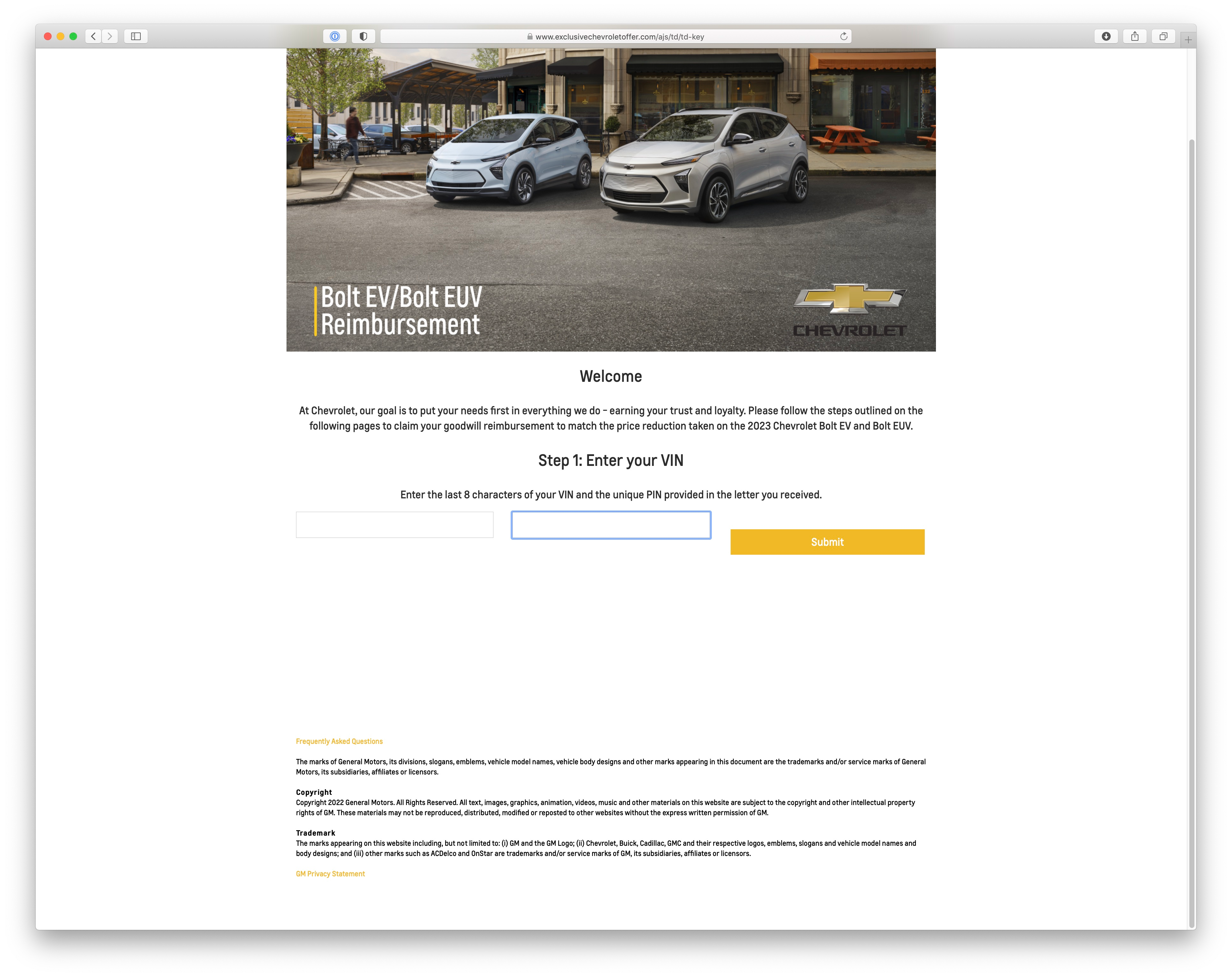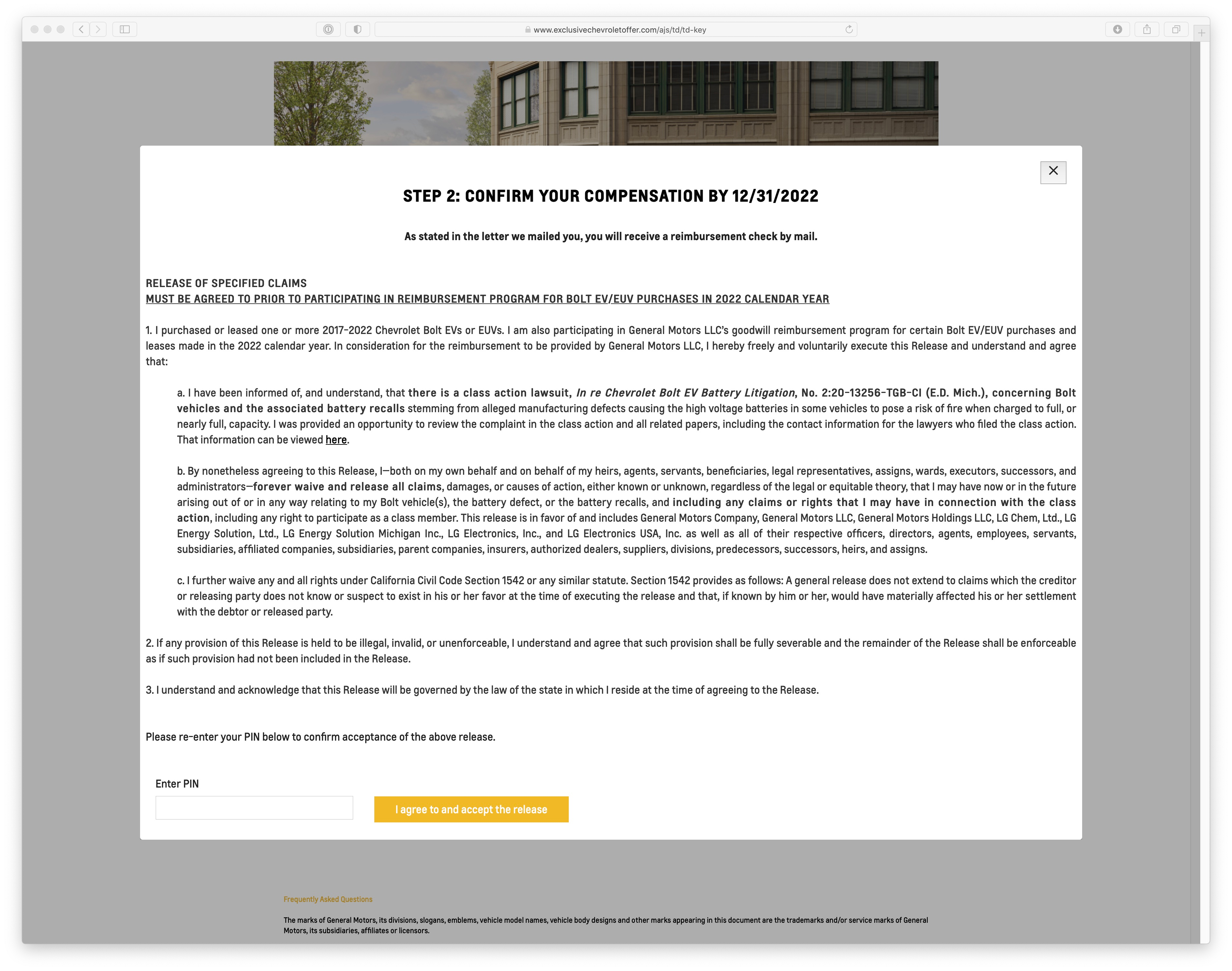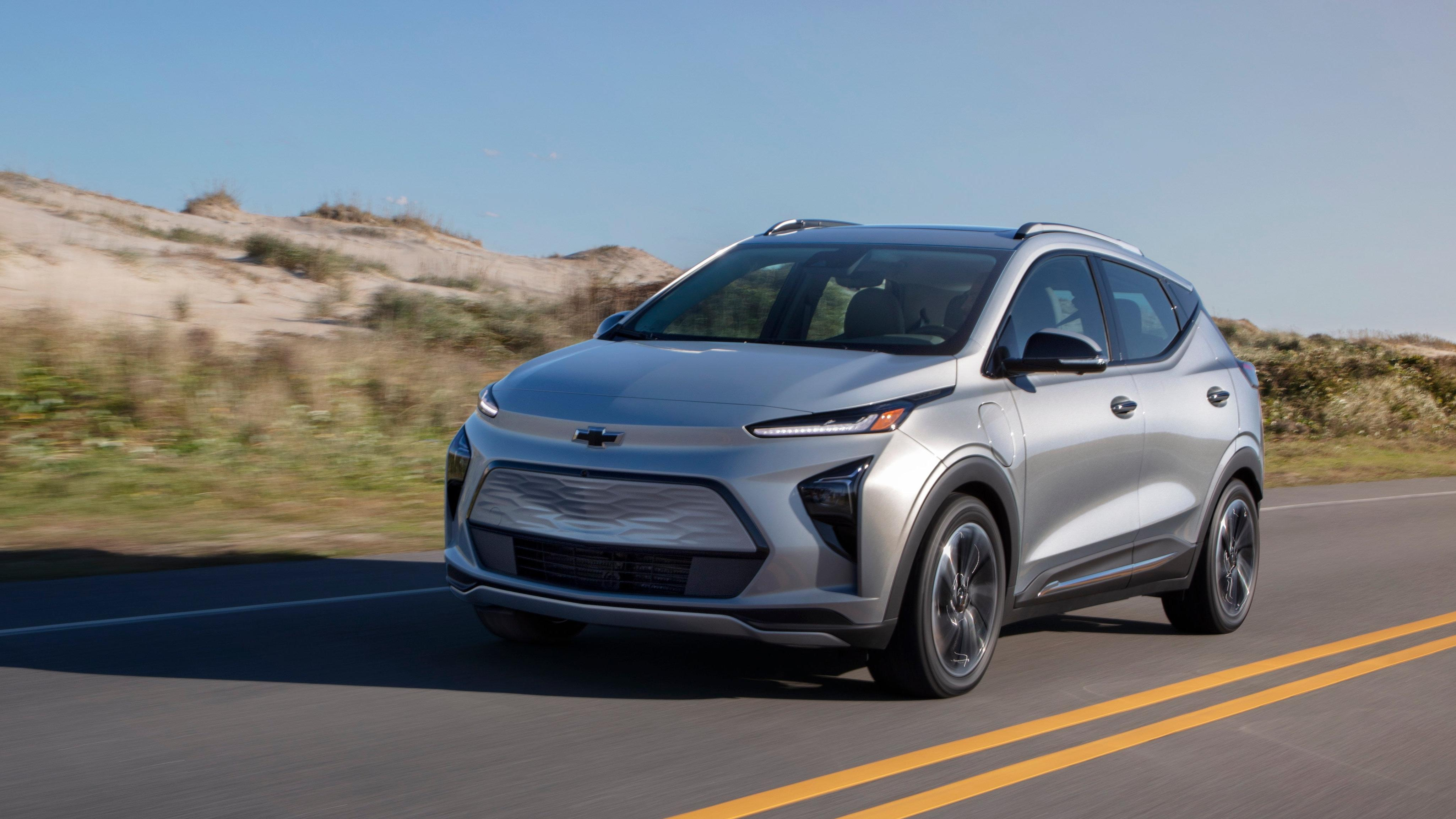Chevy Offers Bolt Owners $6,000 To Waive Right To Sue Over Battery Fires (Update)
Chevy is refunding up to $6,000 to Bolt owners who bought before the company slashed prices on the electric car. But the money comes with a huge catch.
After more than a year of bad news around battery fires, this summer Chevy slashed the price of the electric Bolt and Bolt EUV by as much as $6,000, making the Bolt the most affordable electric car on sale in America. In an effort to appease customers who bought their Bolts before the discount, Chevy offered a cash rebate to existing Bolt owners. But as a tipster points out to Jalopnik, in order to receive the rebate, Bolt owners have to waive all rights to sue GM over the vehicle — including their right to sue if their Bolt battery catches fire.
Update: After this article was published, a General Motors representative contacted Jalopnik with an official statement, which has been added to the end of this article.
First, let's get caught up on the whole battery fire saga. In late 2020, GM recalled 68,000 Bolts due to a risk of the batteries catching fire while parked. The fix involved a software update rolled out in April 2021. Not one week later, an affected Bolt caught fire in Virginia, destroying the garage it was parked in. More Bolt fires followed, even after a second recall, leading the NHTSA to issue a recommendation that Bolt owners park outside and avoid leaving their cars plugged in overnight. A third recall issued in late July 2021 finally offered to replace defective battery packs, in lieu of the previous software update.
By August 2021, the various Bolt recalls had cost GM $800 million; that month, GM expanded the recall to include every Bolt ever made, committing a fresh $1 billion to the battery-replacement program and offering a new 8-year, 100,000 mile warranty on replacement battery packs. Battery supplier LG Chem's stock value lost $6 billion after GM suggested it would hold LG responsible for the $1-billion-plus recall costs. In September, yet another Bolt fire prompted GM to advise owners to park 50 feet away from other cars. By then, the recall had ballooned to 141,000 vehicles, in response to 16 vehicle fires.
GM restarted the Bolt assembly line in April 2022, and pushed out new ads that highlighted the convenience of driving an EV (and pointedly did not mention anything about recalls). And, finally, in June 2022, Chevy knocked $5,000 off the MSRP of the 2023 Bolt and more than $6,000 off the price of the 2023 Bolt EUV.
Got it? Cool. So, a Jalopnik reader owns a Bolt that's eligible for the rebate. But when this reader began the process of claiming the rebate — which, in their case, totals $5,400 — they noticed some concerning fine print they had to agree to in order to proceed. Our tipster provided a screenshot of the screen where they were asked to enter their VIN:

Entering the VIN brought up this release, which Bolt owners are required to agree to in order to proceed with the reimbursement.

The agreement reads, in full (emphasis added by Jalopnik):
RELEASE OF SPECIFIED CLAIMS
MUST BE AGREED TO PRIOR TO PARTICIPATING IN REIMBURSEMENT PROGRAM FOR BOLT EV/EUV PURCHASES IN 2022 CALENDAR YEAR
1. I purchased or leased one or more 2017-2022 Chevrolet Bolt EVs or EUVs. I am also participating in General Motors LLC's goodwill reimbursement program for certain Bolt EV/EUV purchases and leases made in the 2022 calendar year. In consideration for the reimbursement to be provided by General Motors LLC, I hereby freely and voluntarily execute this Release and understand and agree that:
a. I have been informed of, and understand, that there is a class action lawsuit, In re Chevrolet Bolt EV Battery Litigation, No. 2:20-13256-TGB-CI (E.D. Mich.), concerning Bolt vehicles and the associated battery recalls stemming from alleged manufacturing defects causing the high voltage batteries in some vehicles to pose a risk of fire when charged to full, or nearly full, capacity. I was provided an opportunity to review the complaint in the class action and all related papers, including the contact information for the lawyers who filed the class action. That information can be viewed here.
b. By nonetheless agreeing to this Release, I—both on my own behalf and on behalf of my heirs, agents, servants, beneficiaries, legal representatives, assigns, wards, executors, successors, and administrators—forever waive and release all claims, damages, or causes of action, either known or unknown, regardless of the legal or equitable theory, that I may have now or in the future arising out of or in any way relating to my Bolt vehicle(s), the battery defect, or the battery recalls, and including any claims or rights that I may have in connection with the class action, including any right to participate as a class member. This release is in favor of and includes General Motors Company, General Motors LLC, General Motors Holdings LLC, LG Chem, Ltd., LG Energy Solution, Ltd., LG Energy Solution Michigan Inc., LG Electronics, Inc., and LG Electronics USA, Inc. as well as all of their respective officers, directors, agents, employees, servants, subsidiaries, affiliated companies, subsidiaries, parent companies, insurers, authorized dealers, suppliers, divisions, predecessors, successors, heirs, and assigns.
c. I further waive any and all rights under California Civil Code Section 1542 or any similar statute. Section 1542 provides as follows: A general release does not extend to claims which the creditor or releasing party does not know or suspect to exist in his or her favor at the time of executing the release and that, if known by him or her, would have materially affected his or her settlement with the debtor or released party.
2. If any provision of this Release is held to be illegal, invalid, or unenforceable, I understand and agree that such provision shall be fully severable and the remainder of the Release shall be enforceable as if such provision had not been included in the Release.
3. I understand and acknowledge that this Release will be governed by the law of the state in which I reside at the time of agreeing to the Release.
Note the part in bold: Forever waive and release all claims, damages, or causes of action arising out of my Bolt vehicle, the battery defect, or the battery recalls.
To our tipster, and to me, this sounded a lot like Bolt owners who wanted the rebate would give up their right to sue for damages, even if the Bolt's battery caught fire due to the defect that's been plaguing GM for more than a year.
To confirm this, I reached out to a man familiar to all Jalopnik regulars: Steve Lehto, regular Jalopnik contributor and an experienced lawyer licensed in Michigan, specializing in automobile warranty law.
"This release looks fairly standard at first blush but most releases I see result from lawsuits filed on behalf of clients regarding their defective cars," Lehto told me via email. "In those cases, my clients know what the problem(s) with their car is and have decided to settle with that in mind. In the Bolt EV setting there seems to be a slightly different problem: Owners get a 'rebate' to make up for a perceived pricing disparity. In exchange for the rebate, they waive legal rights — present or future — arising from the car, the battery defects or the never-ending battery recalls.
"Instead of thinking of this as a rebate, think of it as a legal release, a document settling a legal claim against GM. Although these owners may not have raised legal claims against GM, they are giving up their right to do so in exchange for the 'rebate,'" Lehto continued.
"If my client owned an out-of-warranty Bolt and parked outside, I wouldn't argue with them too much if they wanted to sign and take the money. But a Bolt still under warranty and being parked in an attached garage? I'd give them a lot of pushback on it — keeping in mind all that they are giving up for the rebate."
It doesn't get much more direct than that.
Lehto — whose YouTube channel you should absolutely check out — also explained to me that this release doesn't affect one important thing: recalls. Even if a Bolt owner agreed to this legal release in exchange for the rebate, GM would still be required by law to perform recall repairs or inspections affecting that owner's car. So, hypothetically, if GM continued to issue recalls over the battery issue, a customer who accepted the rebate would still be contacted, and still be eligible for no-cost repairs or updates.
But if that customer's Bolt caught fire and burned down their garage — or worse — they'd be barred from suing GM or LG. And such an owner would be barred from participating in any current or future class-action lawsuits against GM over the battery defect.
This was the first time Lehto had seen such a specific release, and one with such broad implications. It actually kind of shocked Lehto, as it did me, not to mention the Bolt-owning Jalopnik tipster who alerted us to the release. It seems to be part of a recent trend at GM, which recently offered a $5,500 discount to Cadillac Lyriq buyers who sign a non-disclosure agreement preventing them from discussing any issues they have with the car — an offer the NHTSA is now investigating. And just last week, GM said it would cancel the warranty on any Corvette Z06, Cadillac Escalade-V, or GMC Hummer EV re-sold within 1 year of original purchase.
Would you still take the money in exchange for waiving your right to sue over potential future damages, injuries, or other issues? Let us know in the comments below.
Update: After this article was published, a GM representative provided Jalopnik with the following statement:
"The agreement for the reimbursement program does contain language that waives claims against GM and identifies existing litigation. This is a common practice when it comes to programs like this. It does not waive claims involving any potential recalls in the future."
